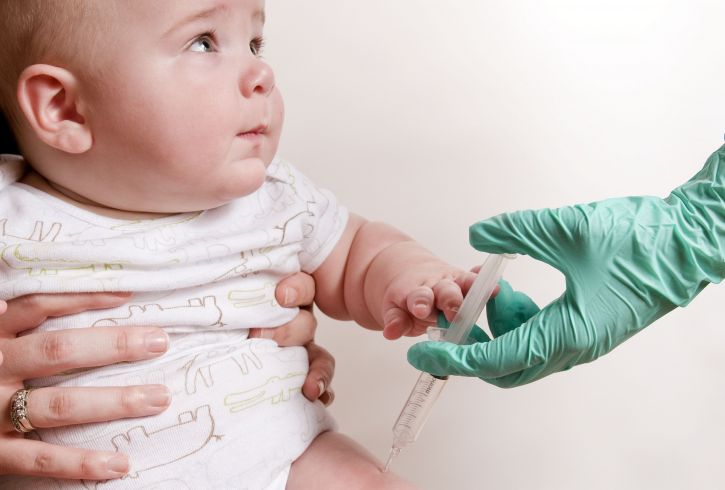Disproving Arguments of the Anti Vaccine Movement

By Nikhil Gangasani
The anti-vaccine movement perpetuates the notion that vaccines cause autism spectrum disorder (ASD). This false causation is attributed to misunderstood and pseudoscientific factors, but its beginnings are linked to a fraudulent study conducted towards the end of the 20th century.

“Baby was receiving his scheduled vaccine injection in his right thigh muscle ie intramuscular injection” by Amanda Mills is licensed under CC BY 4.0
In 1998, researcher Andrew Wakefield published a study in the medical journal Lancet citing causation between the MMR (measles, mumps, rubella) vaccine and ASD. Wakefield theorized that the MMR vaccine contained a live virus which freed toxins from the gut to the bloodstream, damaging the developing brains of children. Subsequent studies failed to reproduce evidence of Wakefield’s claim, and an investigation into Wakefield’s methodology revealed he falsified the results. Lancet finally retracted the article in 2010, but by then, the anti-vaccine movement arose.
Coincidentally, a parental report on early autistic symptoms discovered that parents from multiple countries first discovered symptoms of autism in their children from ages of 10 months to 2.7 years.
Since Wakefield’s theory collapsed, the anti-vaccine movement has desperately looked for other evidence that vaccines cause autism. Parents in this movement claim that their children developed autism soon after receiving the MMR(measles, mumps, rubella) vaccine. According to the latest CDC vaccine schedule, the CDC recommends children receive their first MMR dose at 12 to 15 months of age. Coincidentally, a parental report on early autistic symptoms discovered that parents from multiple countries first discovered symptoms of autism in their children from ages of 10 months to 2.7 years. Furthermore, the symptom most frequently observed by parents in their autistic children was delayed language – observed when their children were an average age of 18.4 months. These results suggest that the onset of ASD in young children merely coincides with the MMR vaccine schedule; not that receiving the MMR vaccine leads to autism.
These studies demonstrate that the increased prevalence of autism is linked more to broader screening and inclusion of persons outside hospitals and less to an increased vaccine schedule.
Anti-vaccine advocates have also pointed to the upgraded vaccine schedule and presence of thimerosal, a mercury containing compound, in vaccines as reasons for higher rates of autism. Indeed, a report by the CDC shows that rates of autism have increased in the United States from 6.7 cases for every 1000 people in the year 2000 to 14.8 cases for every 1000 people in the year 2010. However, a recently published Danish study revealed that 60% of the increase in ASD prevalence could be attributed to an increase in diagnostic criteria for ASD and inclusion of outpatient contacts in ASD studies. Furthermore, in 2001, thimerosal was removed from all vaccines except those for influenza, and studies performed by the CDC have shown that there is no correlation between vaccines containing thimerosal and the development of ASD. These studies demonstrate that the increased prevalence of autism is linked more to broader screening and inclusion of persons outside hospitals and less to an increased vaccine schedule. Also, despite the 2001 removal of thimerosal, autism prevalence rates have still increased, thus indicating that thimerosal presence in vaccines does not correlate with ASD.
Before the first measles vaccine was created in 1963, an estimated 3 to 4 million Americans fell victim to the highly contagious disease every year. With the widespread use of the MMR (measles, mumps, rubella) vaccine over the following decades, the United States declared measles eliminated in 2000, meaning there was an absence of continuous transmission of measles for at least twelve months in the United States at this time. However, as the anti-vaccine movement has gained influence, outbreaks of measles have increased in the United States as herd immunity is compromised. Hopefully, disasters like those in Disneyland will be avoided as those who currently choose to not vaccinate their children realize the danger they bring both to their own kids and other immunosuppressed individuals who cannot be vaccinated for safety reasons.
